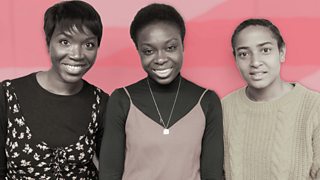Girls - Theresa Ikoko brings her award-winning play about the kidnapping of three Nigerian girls to Radio 4
Theresa Ikoko
Writer
Tagged with:
What did you have to do and think about to adapt your for ?
The main thing was the strict time constraint. I thought that would be really tough. It actually went really smoothly. I thought I would have to lose character and story, but I don't think I did. It made me want to take a look at the stage play and see if there was anything in it that wasn't needed.
But one thing that I did notice was that in 45 minutes, the subtle things you think you're saying sort of scream. I had to think about whether I wanted to boldly make declarations or not because it was a little harder to hide things behind characters and their nuances.
Sound is so important with radio. It seems obvious, but people are really listening. The words and sounds tell the whole story, so you have to offer a little more for the listeners' imagination to grab hold of - to make up for the things that weren't being seen. In a way it made the story feel quite limitless. The audience can paint whatever picture you outline. It can be as vast or as delicate as the story requires.

The cast of Girls on Radio 4 (Faith Alabi, Joan Iyiola, Amaka Okafor)
How was the production process different?
The production process was so quick and intense. It was all over in two long days, in a windowless room. It definitely built a really close team, super fast.
It felt really organic and collaborative. Ideas were happening in the room and being tried then and there. There were so many people with such specific expertise that I was able to run things by - lines that didn't feel like they worked or story that I wasn't sure came across. Sometimes the answer wasn't in the words but in the microphone positioning, work or sound effects etc.
It was amazing to see how large scale scenes were made with skill and innovation and simple props.
I think the time pressure added an excitement to the process. Everything felt immediate and urgent.
Not having rehearsal time was really different to the theatre process. But I knew the actors involved and I was really confident in them. They were familiar with their characters and the story so it felt like we had a head start. I think that helped with not having time to really unpick the script and rehearse like in theatre. The actors were so instinctive and brave and open and I think it just made the process feel super alive and electric.

Theresa Ikoko
How is the writer’s role in the production process different?
I don't know if my role felt very much different than it did with theatre. I have a super close and trusting relationship with , the producer. I think working with someone you admire and trust, in any forum, makes it easy and offers a learning experience. Abigail really gets me and I think we have such a mutual fondness for and understanding of the characters and story that it was so easy to communicate and hash out challenges with cuts, story etc. I really didn't want it to be over when we were done. It was a dream team, that I feel very fortunate to have been a part of.
What have you learned in writing for radio?
Radio has broadened my thinking about how I tell stories. I found the visual limitation challenging at first and then liberating. I'm really keen to see how thinking about sound can do more for my stage and/or screenwriting.
Timing has been crucial too. I'm not one for long stories but I think I can look at doing more with less time. I think there is an presumption that epic stories need epic running times and intervals. Though there is of course a place for that, and some of my favourite plays and films run well over two hours, but I think I've learned that I don't need minutes to justify or prove scale.
Theresa Ikoko won the in 2015 and the for Most Promising Playwright in 2016. She studied psychology and has a Masters in Criminology and Criminal Justice. Theresa has had a variety of roles in prisons, secure settings and social inclusion/community engagement projects and now works in the area of gangs and serious youth violence.
